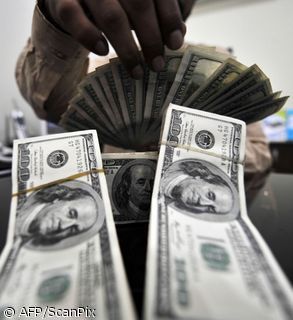Hungary will probably postpone euro adoption from 2008 to 2010 because of high inflation and budget deficits
Published:
26 February 2004 y., Thursday
Hungary will probably postpone euro adoption from 2008 to 2010 because of high inflation and budget deficits, Finance Minister Tibor Draskovics said. The National Bank of Hungary (MNB) has argued for faster adoption, saying it will boost growth.
Draskovics detailed some proposed cuts in state expenditure. Plans include reducing the number of higher civil servants, such as government advisors and state secretaries; the number of state-run foundations; and support for ethnic Hungarians abroad.
January inflation was higher than the Finance Ministry expected, at 6.6% yr/yr and 2.1% month-on-month. It expects annual inflation in 2004 to be near the higher end of its 6%–6.5% target band.
The February budget deficit is anticipated to be about Ft 180 billion (Ђ684 million), boosted by interest payments, Finance Ministry sources said. The estimated February gap would push the two-month figure to Ft 399 billion, or 43% of the full-year target.
Industrial output grew 6.4% in 2003, after a 2.8% increase in 2002, the Central Statistics Office (KSH) said. In December output fell 0.8% month-on-month.
Real wages rose by 9.2% in 2003, as the result of a 14.3% rise in average net wages and twelve-month consumer price inflation of 4.7%, the KSH announced.
The government wants to raise R&D spending to 1.8%–1.9% of GDP by 2006, and to 3% by 2010, Prime Minister Pйter Medgyessy said. Last year the figure was barely above 1%.
The number of operating businesses in Hungary rose 2.6%, to a total of 969,559 in 2003, including not-for-profit and budget-funded businesses, the KSH said.
Šaltinis:
bbj.hu
Copying, publishing, announcing any information from the News.lt portal without written permission of News.lt editorial office is prohibited.
The most popular articles
 In another move to strengthen the financial system, the Commission is proposing controls on credit rating agencies - private companies that evaluate financial risks for investors.
more »
In another move to strengthen the financial system, the Commission is proposing controls on credit rating agencies - private companies that evaluate financial risks for investors.
more »
 Monday 10 November saw a large report land on the desk of MEPs in the Budgetary Control Committee.
more »
Monday 10 November saw a large report land on the desk of MEPs in the Budgetary Control Committee.
more »
 EU wants G20 meeting to pave the way for reform of the international financial system.
more »
EU wants G20 meeting to pave the way for reform of the international financial system.
more »
 New Yorkers reflect on the election of Barack Obama as the 44th President of the United States.
more »
New Yorkers reflect on the election of Barack Obama as the 44th President of the United States.
more »
 The ability of the EU's common agriculture policy (CAP) to cope with the challenges of affordable food and climate change was discussed in Brussels 3-4 November.
more »
The ability of the EU's common agriculture policy (CAP) to cope with the challenges of affordable food and climate change was discussed in Brussels 3-4 November.
more »
 European Union economic growth should be 1.4% in 2008, half what it was in 2007, and drop even more sharply in 2009 to 0.2% before recovering gradually to 1.1% in 2010 (1.2%, 0.1% and 0.9%, respectively, for the euro area).
more »
European Union economic growth should be 1.4% in 2008, half what it was in 2007, and drop even more sharply in 2009 to 0.2% before recovering gradually to 1.1% in 2010 (1.2%, 0.1% and 0.9%, respectively, for the euro area).
more »
 There are an estimated 4-8 million immigrants working illegally in the European Union.
more »
There are an estimated 4-8 million immigrants working illegally in the European Union.
more »
 Hit by economic turmoil and the sharp global downturn, growth in the EU slows almost to a halt.
more »
Hit by economic turmoil and the sharp global downturn, growth in the EU slows almost to a halt.
more »
 The top priority is to cushion the impact of the financial crisis on jobs, purchasing power and prosperity of EU citizens.
more »
The top priority is to cushion the impact of the financial crisis on jobs, purchasing power and prosperity of EU citizens.
more »
 The International Monetary Fund has approved short-term financing to help emerging market economies weather the global financial storm.
more »
The International Monetary Fund has approved short-term financing to help emerging market economies weather the global financial storm.
more »